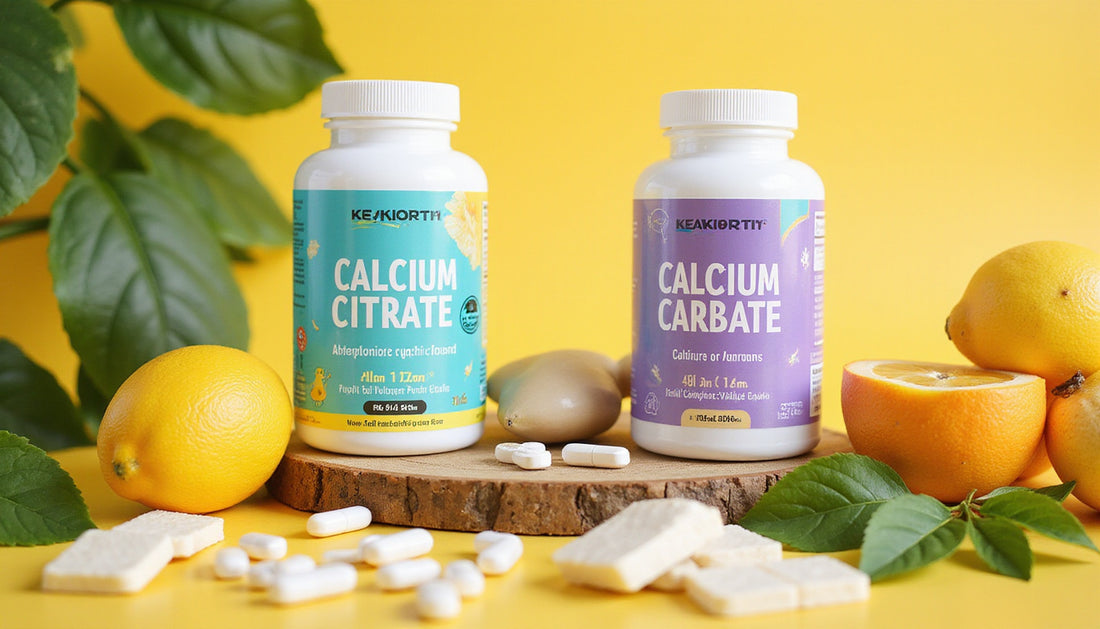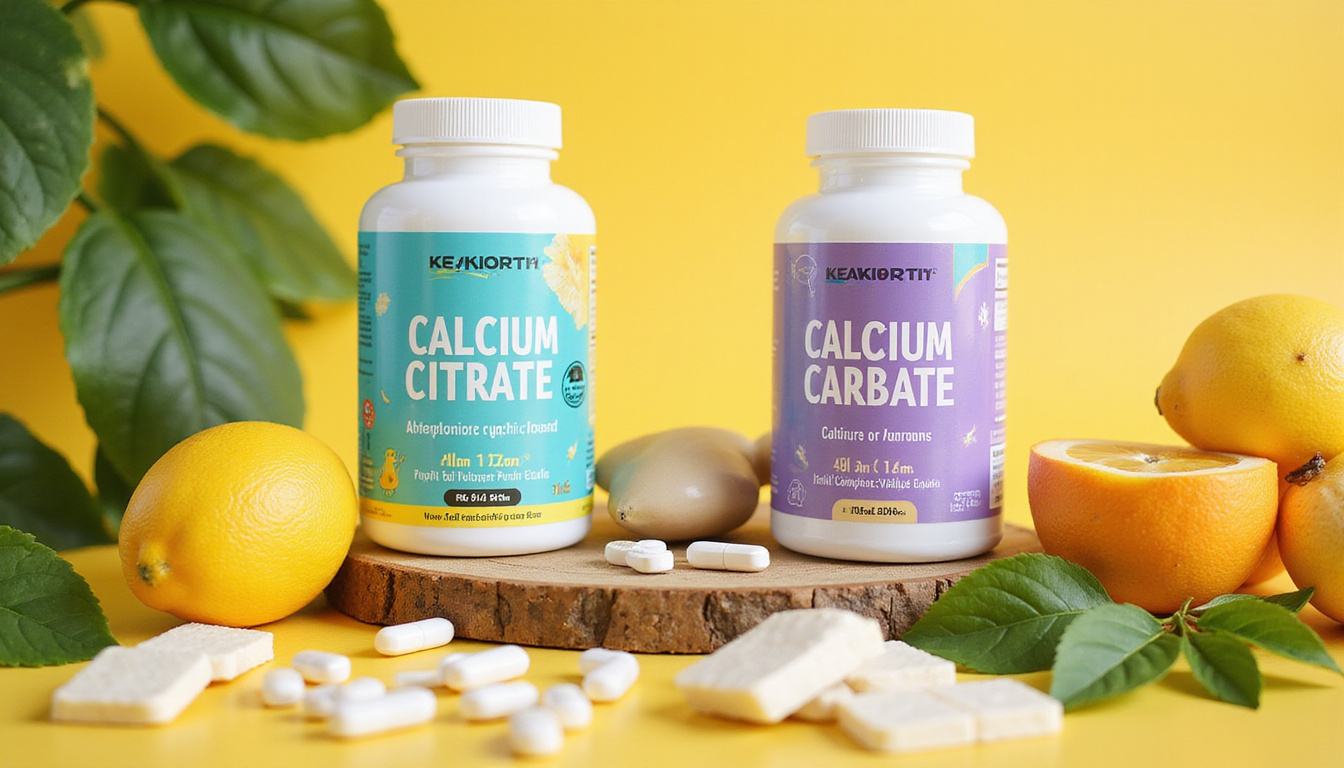
Calcium Citrate vs. Calcium Carbonate: Which Supplement Reigns Supreme for Better Absorption?
Share
In today’s health-conscious world, individuals are increasingly turning to natural supplements for optimal wellness. Among the essential nutrients, calcium plays a crucial role in maintaining bone health, yet the type of calcium supplement one chooses can significantly affect its effectiveness. This article delves deep into two of the most popular forms of calcium supplements—calcium citrate and calcium carbonate. We'll explore their differences in absorption, bioavailability, and gastrointestinal effects to aid you in making informed health choices grounded in both science and faith-driven principles.

Key Takeaways
- Calcium citrate has higher bioavailability and is easier on the stomach compared to calcium carbonate.
- Calcium carbonate is more affordable but requires stomach acid for absorption, making it less suitable for some individuals.
- It's important to consider personal health needs, age, and digestive sensitivity when choosing between calcium citrate and calcium carbonate.
Understanding the Differences: Calcium Citrate vs. Calcium Carbonate
# Understanding the Differences: Calcium Citrate vs. Calcium Carbonate
When it comes to maintaining bone health, calcium supplements are often a topic of discussion. Among the myriad of options available, two leading forms are calcium citrate and calcium carbonate. This article delves into their differences, focusing on bioavailability and gastrointestinal effects to help you make a more informed decision.
## What is Calcium Carbonate?
Calcium carbonate is perhaps the most recognized form of calcium supplement, derived from natural sources such as limestone or marble. Its popularity stems from its affordability and high elemental calcium content, which is about 40% by weight. However, while it has its pros, it’s not without cons.
### Pros:
• High Elemental Calcium Content: With approximately 40% elemental calcium, calcium carbonate is highly effective in providing the necessary calcium dose.
• Affordability: Its low price point and availability in most supermarkets make it a go-to for many consumers.
• Widespread Availability: Found in pharmacies and health stores, it’s easily accessible for all.
### Cons:
• Low Bioavailability: This form requires stomach acid for optimal absorption, which can be a drawback for some individuals.
• Gastrointestinal Issues: Many experience bloating, gas, or constipation as side effects, making it less appealing for some users.
• Food Requirement: Calcium carbonate generally must be taken with food to enhance absorption, which can complicate dosing.
## What is Calcium Citrate?
Calcium citrate, in contrast, binds calcium with citric acid, resulting in a form that’s more bioavailable. This means it can be absorbed more readily by the body, making it a favorable choice for various individuals.
### Pros:
• Higher Bioavailability: Calcium citrate doesn’t rely on stomach acid for absorption, which can be beneficial for individuals with digestive issues.
• Gentler on the Stomach: Many users report fewer gastrointestinal side effects such as bloating or constipation.
• Flexible Dosing: It can be taken with or without food, offering convenience for busy lifestyles.
• Compatibility with Medications: Calcium citrate is a suitable option for those on acid-reducing medications, as it still absorbs well without stomach acid.
### Cons:
• Lower Elemental Calcium Content: With only 21% elemental calcium by weight, individuals may need to take more doses to meet their calcium needs.
• Cost Factor: Calcium citrate tends to be more expensive than calcium carbonate, which may deter some consumers.
## Key Considerations When Choosing
When selecting the right calcium supplement, consider the following factors:
• Age and Stomach Acid Levels: Older adults or those with decreased stomach acid may find calcium citrate to be more beneficial due to its better absorption.
• Digestive Sensitivity: For individuals prone to gastrointestinal discomfort, the gentler effects of calcium citrate may be preferable.
• Convenience: If you lead a busy lifestyle and prefer not to plan meals around your supplement, calcium citrate offers more flexibility.
• Budget: Price sensitivity plays a critical role—while the long-term benefits of calcium citrate may outweigh the cost, calcium carbonate remains a viable option for those on a tighter budget.
## Conclusion
In conclusion, both calcium citrate and calcium carbonate serve their purpose in meeting calcium needs. However, calcium citrate is often considered superior due to its enhanced absorption and gentler impact on the digestive system. For older individuals and those with specific health concerns, opting for calcium citrate may be the best path forward. As always, it’s crucial to consult a healthcare provider to determine the most suitable option for your personal health needs. By making informed choices, you can promote holistic wellness and stewardship over your body, aligning with a faith-grounded worldview that values personal freedom in health choices.
Choosing the Right Supplement for Your Needs
## Opt for Holistic Health with the Right Calcium Supplement
In the quest for better bone health through natural, plant-based medicine, many individuals are turning to calcium supplements as a vital part of their wellness strategy. With various options available, two of the most common choices are calcium citrate and calcium carbonate, both of which offer distinct benefits and drawbacks. Understanding these differences can empower you to make informed decisions aligned with a faith-centered approach to health that values personal freedom and natural alternatives over synthetic treatments.
### The Case for Calcium: Why It Matters
Calcium is an essential mineral contributing to strong bones and teeth, as well as muscle and nerve function. As we age, our bodies require adequate calcium to ensure that bone density is maintained, reducing the risk of osteoporosis and fractures. However, the form of calcium you choose can significantly impact how well your body absorbs this crucial mineral.
### Calcium Carbonate: The Affordable Option
Calcium carbonate is widely recognized for its affordability and high elemental calcium content of about 40%. Derived from natural sources like limestone or marble, this option is readily available in supermarkets and pharmacies. However, it's essential to consider several factors before choosing this supplement:
• Pros: Its high elemental content means fewer tablets might be needed to achieve the desired calcium intake, making it an economical choice for many.
• Cons: On the downside, calcium carbonate requires sufficient stomach acid for optimal absorption, which can be problematic for older adults or individuals with low stomach acid. Moreover, gastrointestinal issues such as bloating and constipation are common side effects that can deter many from using this supplement.
### Calcium Citrate: The Bioavailable Choice
Calcium citrate, a combination of calcium and citric acid, stands out for its superior bioavailability. This means your body can absorb calcium citrate more efficiently than calcium carbonate.
• Pros: One of the significant advantages of calcium citrate is that it doesn’t rely on stomach acid for absorption. This makes it a favorable option for those with digestive issues or anyone taking acid-reducing medications. It is also gentle on the stomach, typically causing fewer gastrointestinal problems.
• Cons: Although calcium citrate has a lower elemental calcium content (approximately 21%), making it necessary to take more tablets to meet your daily needs, many find that the trade-off is worth it for the better absorption.
### Tailoring Your Calcium Supplement to Your Needs
When deciding between calcium citrate and calcium carbonate, consider your individual health circumstances:
• Age and Digestive Health: Older adults often benefit more from calcium citrate due to its enhanced absorption and gentler effects on the digestive system.
• Lifestyle Flexibility: If you prefer convenience, calcium citrate can be taken at any time, with or without food. In contrast, calcium carbonate needs to be taken with meals.
• Cost Considerations: While calcium carbonate may seem more budget-friendly, weigh this against the potential long-term health benefits of more effective absorption with calcium citrate.
### Conclusion: Empower Your Health Choices
Both calcium citrate and calcium carbonate can effectively meet your calcium needs. Still, calcium citrate is frequently viewed as the superior option due to its higher bioavailability and minimal gastrointestinal concerns. As you navigate your personal health journey, remind yourself of the importance of stewardship over your body, embracing practices that align with your values. By consulting with a healthcare provider, you can determine the best option tailored to your unique needs. This proactive approach to health reflects a commitment to holistic wellness, personal freedom in health choices, and a lifestyle grounded in faith. Explore more about plant-based health solutions at JustVitamins.org and empower your journey toward better health.
